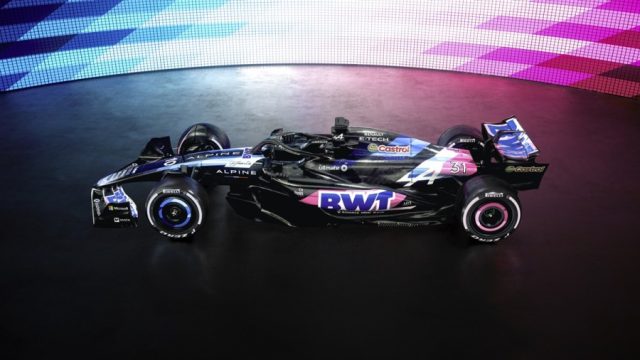The Alpine F1 team became the latest outfit to unveil its new look for the 2024 championship. Here’s the key details from the launch.
After years of overbearing middle-management as part of the Renault Group, the Alpine F1 Team starts afresh in 2024 with a new, simplified leadership structure, which will hopefully be for the better. With less commercial meddling going on, us neutrals can only hope that the F1 team will be well-funded, but left alone to do its work more effectively. So far, given the relative absence of new Alpine CEO Philippe Kreif from any headlines, initial assumptions are that things are flowing smoother than when Laurent Rossi was at the helm. Anyway, that’s the big off-track change that Alpine has undertaken over winter, but how has the fresh approach translated into actual car design? Let’s find out.
The livery
First of all, it’s worth briefly touching upon the livery (or, liveries). As has become tradition for Alpine, the French marque will run two different liveries throughout the year – the main one containing more blue on the nose to represent the car brand (as shown above), and a secondary one containing more pink to appease the team’s biggest sponsor, BWT (as shown below). However, whereas the BWT livery only ran at the opening two rounds last year, the 2024 edition will be present at eight of the 24 scheduled grands prix.
This Alpine A524 alternate pink livery will be used at eight grands prix.
Predictably, the liveries follow the trend seen with every other team’s launch so far this year, and that is the much greater presence of bare carbon. The reason for this trend essentially boils down to weight-saving, as less paint means less weight. We’re talking fine margins, but that is what F1 is all about after all. Anyway, from a spectator’s point of view, it’s less than ideal. What we’re set to be faced with is a grid of mostly dark, black cars, only identifiable by their accent colors.
Fortunately, each car revealed so far does at least have a distinct secondary palette. McLaren sticks out with its bright papaya orange, whereas the fluorescent green of the newly-rebranded Stake F1 team pops well too. The Alpine livery, with its blues and pinks is also fairly distinctive, and in isolation does look good to me. Let’s just hope that when we see the cars on the circuit together, those accent colors are bold and big enough to help us easily spot who’s who.
Technical evolutions
As always, the caveat with any launch-spec F1 car is that it’s unlikely to look this way by the time pre-season testing arrives. However, there are at least some hints at what we can expect from Alpine’s 2024 F1 car – which is called the A524, by the way. Firstly, a side-by-side comparison with the 2023 car reveals that the sidepods have a more aggressive undercut, though the top surface remains pretty much identical (at least in this spec).
As for the wings, the front item displayed at the launch is marginally wider with slightly bigger vanes than before, whereas the rear wing concept is likely to change more often between circuits than previously.
Perhaps the biggest point for improvement for Alpine was the suspension. Last year, the team wasn’t able to cure some baked-in ride and stability problems, though a reworked rear suspension design should help to remedy at least part of that problem. For a more detailed analysis of the car, check out this video.
The Le Mans Hypercar
While we’re here, it’s also worth mentioning the *other* car that Alpine launched yesterday, the team’s Le Mans Hypercar. Named A424, this beautiful prototype arguably looks and sounds far better than its F1 counterpart. It wears a much more traditional Alpine livery, and other neat features like taillights shaped in the mold of Alpine’s logo.
Designed atop an Oreca chassis, the car is powered by a Mecachrome 3.4-liter turbo V6, which bears resemblance to the standard power unit used in Formula 2. The team is set to make its debut in the FIA World Endurance Championship this year, which includes the highly-prestigious Le Mans 24 Hours. Amidst a raft of experienced sportscar talent, the team’s most prominent star name within its driver roster is ex-F1 racer, and son of Michael, Mick Schumacher. However, due to commitments with the Mercedes F1 team as its test driver, it remains to be seen how many WEC races Schumacher will actually compete in.
Overall, expectations for Alpine’s WEC debut should be kept realistic. Although the Oreca chassis is one of the best in the industry, this is still a new car which has received much less development time than the big dogs in endurance racing that have been around for a while. Plus, it’s fair to say that Alpine’s overall WEC driver lineup doesn’t quite have the ‘wow factor’ of some of its rivals. Anyway, in the meantime, check out this video of the Alpine A424 testing at the Barcelona circuit, it’s one beautiful machine.
The post Alpine F1 Team Lifts Lid On 2024 Challenger appeared first on Fast Car.







